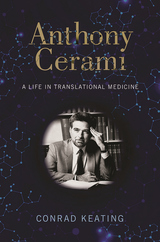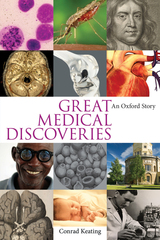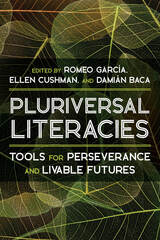2 books about Keating, Conrad

Anthony Cerami
A Life in Translational Medicine
Conrad Keating
Rutgers University Press, 2021
Since the turn of the new millennium, ‘translational research’, the scientific process of bringing disease-targeted knowledge from the laboratory to treat patients in the clinic, has gone mainstream and is now practiced by large universities and institutes across the globe. Into this dynamic of the rapidly changing world of translational medical research this book sets the life of one of the discipline’s most influential practitioners, Anthony Cerami. His work spans more than five decades and culminated in the discovery, invention and development of diagnostics and therapeutics used daily by millions of people. Students in molecular medicine and investigators pursuing basic science in the hope of improving human health will find inspiration in examining the sacrifices and achievements of Cerami’s career in translational medicine. During his three decades at Rockefeller University his cross-disciplinary and laboratory-without-wall approach established ‘rational drug design’ as the most effective means of advancing the fields of parasitology, hematology, immunology, metabolism, therapeutics and molecular medicine. Cerami’s story and that of the evolution of translation are intimately entwined: the contours of Cerami’s career shaped by developments in translation, and in exchange, the field itself molded by Cerami’s work. To understand one is to understand the other. By examining the life of this often overlooked biochemist it is possible to intimately focus on the ideas and thought processes of a scientist who has helped to define the great acceleration in translational research over the past half century – research that, knowingly or otherwise, has most likely affected the life of almost everyone on the planet. We also gain a better understanding of the febrile creative atmosphere that percolated through the laboratories leading the way in translational medicine, and gain insight into the art, science, successes, failures and providence that underlie major scientific breakthroughs. Anybody interested in the questions of where modern medicines come from, how health outcomes around the globe are affected by research and imagination, and where the future of drug discovery is leading, will be rewarded by exploring Cerami’s life in translation. This book is not restricted to those with a professional interest in science, because anyone dedicated to living a life of creativity and discovery will be rewarded by reading this book. In many respects, Cerami’s life reflects the modern metaphor of the ‘American dream’ with his journey from humble beginnings on a chicken farm in rural New Jersey, to occupying a place in the highest echelons of the US scientific establishment. His journey in translational medicine was propelled forward by two obsessions; the idea that he could help people who were sick, and the excitement of discovery. In following his two great passions, he trained a generation of specialists in translational medicine that continue to transform our understanding of, and treatments for, human disease. Anthony Cerami’s work has shown how science has become an important force for social change by laying the foundations of modern translational medicine.
[more]

Great Medical Discoveries
An Oxford Story
Conrad Keating
Bodleian Library Publishing, 2013
The “miracle drug” penicillin was first administered in Oxford in February 1941, leading to a full-blown transformation in the way bacterial infection was diagnosed and treated. What was to become one of the greatest stories of the “golden age of medical discovery” not only had its roots in Oxford, but was the latest in a line of pivotal medical discoveries made in the city.
Great Medical Discoveries offers a short illustrated history of the city’s contribution to the medical sciences, from the medieval period to the present day, when it is home to some of the world’s leading large scientific institutions. In charting this remarkable history, the book showcases twenty discoveries across the centuries. In the mid-twentieth century, for instance, Oxford led the field of experimental medicine, and William Harvey, Thomas Willis, and Thomas Sydenham all gained eponymous status with their pioneering research into the workings of the human body. In the mid-seventeenth century, Dorothy Hodgkin’s development of x-ray crystallography earned her a Nobel Prize in Chemistry. Meanwhile, the work of epidemiologist Richard Doll saved millions of lives by making clear the long-term dangers of smoking and the benefits of quitting.
Great Medical Discoveries traces these and other examples of groundbreaking research—from the scientific application of anesthetics to new treatments for hemophilia and life-saving advances in neurosurgery—and shows how they form part of a wider tapestry of work that has helped shape the medical sciences and improve human health.
Great Medical Discoveries offers a short illustrated history of the city’s contribution to the medical sciences, from the medieval period to the present day, when it is home to some of the world’s leading large scientific institutions. In charting this remarkable history, the book showcases twenty discoveries across the centuries. In the mid-twentieth century, for instance, Oxford led the field of experimental medicine, and William Harvey, Thomas Willis, and Thomas Sydenham all gained eponymous status with their pioneering research into the workings of the human body. In the mid-seventeenth century, Dorothy Hodgkin’s development of x-ray crystallography earned her a Nobel Prize in Chemistry. Meanwhile, the work of epidemiologist Richard Doll saved millions of lives by making clear the long-term dangers of smoking and the benefits of quitting.
Great Medical Discoveries traces these and other examples of groundbreaking research—from the scientific application of anesthetics to new treatments for hemophilia and life-saving advances in neurosurgery—and shows how they form part of a wider tapestry of work that has helped shape the medical sciences and improve human health.
[more]
READERS
Browse our collection.
PUBLISHERS
See BiblioVault's publisher services.
STUDENT SERVICES
Files for college accessibility offices.
UChicago Accessibility Resources
home | accessibility | search | about | contact us
BiblioVault ® 2001 - 2024
The University of Chicago Press









